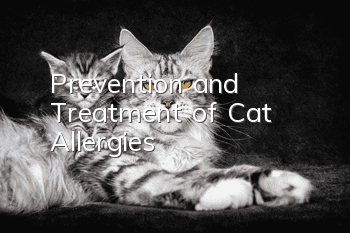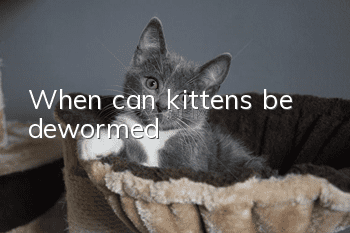Prevention and Treatment of Cat Allergies

Cats, like humans, are allergic to certain foods, and they can occur at any age and with any ingredient. Many cat allergies are caused by eating the same food for a long time. There are many symptoms of cat allergies. Let’s take a look at the symptoms of cat allergies and how to deal with them.
Symptoms of cat allergies
Skin symptoms include itching, redness, hair loss, scaling and dermatitis.
Gastrointestinal symptoms may include vomiting and diarrhea.
Many diseases can cause similar clinical symptoms, so seek help from a veterinarian to confirm the diagnosis.
Diagnosis of food allergy
Food allergies are diagnosed through feeding tests. In the feeding experiment, you can use a protein that has not been fed before (duck, venison and other similar things), or feed the pet after hydrolyzing the protein, or reducing the molecular weight of the protein. A food trial needs to last a minimum of ten weeks. If symptoms do not resolve after ten weeks, other diagnoses need to be considered.
Causes of allergies
Allergic reactions may occur within minutes, hours or even days, so the allergen does not necessarily come from a newly added ingredient in the food. Sometimes certain ingredients in commonly eaten foods can also cause allergies in cats. In other words, it is sometimes difficult to find the specific allergen, and most owners often find the wrong target.
Cat skin problems sometimes occur with food allergies
Cats are allergic to many foods, and some symptoms will be reflected on the skin. It often manifests as hair loss, skin redness, oil exudation, increased dandruff, flushing of the face and eye sockets and other related symptoms. This is a food allergy skin disease. If you stop feeding your cat the allergenic food, the symptoms will lessen or disappear. In order to distinguish food allergic skin diseases from other cat skin diseases caused by external parasites, fungi, bacteria, etc., you must go to the hospital for laboratory tests or even endocrine examinations to find the crux of the problem.
Many owners know that cats can be allergic to milk, but they do not know that cats, as carnivores, can also be allergic to certain meats (such as beef, mutton or some seafood). Certain substances (usually proteins) in food enter the body and are regarded as invading pathogens by the immune system. The immune system releases a specific type of immunoglobulin E, which combines with the food to produce many chemicals, causing allergies. The protein content in meat and fish is relatively high, and the protein molecules are relatively large, which can easily cause cat allergies. Even though many owners knew that cats were allergic, they never imagined that it was the cat’s favorite meat that caused the allergy!
Prevention and treatment of allergies
Once a cat is found to be allergic to a certain food, it is necessary to find out the cause of the allergy. If it cannot be ruled out that it is allergic to what food it eats; or the cat has a very weak constitution and is prone to skin and gastrointestinal problems due to dietary allergies. The disease can be treated by changing the diet to non-allergenic foods.
Hypoallergenic prescription cat food is ideal for cats with food allergies. This product hydrolyzes protein, making it highly digestible and has a very low likelihood of causing allergic reactions. The added DHA/EPA can reduce skin inflammation caused by allergies. At the same time, its patented skin barrier complex can enhance the skin's barrier function.
Common misunderstandings about allergies
Misunderstanding: Since cats sometimes become allergic to meat, then make your own vegetarian food for cats.
Correction Home-cooked vegetarian food cannot meet all the nutritional needs of cats, nor can it guarantee that cats will not be allergic.
Cats are carnivores. Even if they are allergic to certain meats, it does not mean that they can live a long and healthy life by eating vegetables and leaves. Cats need high-quality protein. The synthesis of these proteins cannot be achieved by directly ingesting fresh vegetarian food. Therefore, you should still choose professional hypoallergenic cat food. The protein in this type of prescription food has been hydrolyzed and processed, which not only meets the nutritional needs of cats. Needed, safer and easier to digest.
Myth: If cats have allergies, they only need to eat hypoallergenic prescription foods for a period of time, and then they can be cured once and for all.
Correction: Prescription food will not cure allergies. If the cat is allergic, it should eat prescription food for a long time.
Hypoallergenic prescription foods are not medicines. Cats cannot completely get rid of allergies. In fact, even if a person suffers from allergies, long-term desensitization treatment is needed to alleviate allergic symptoms. If the cat itself is sensitive, it is recommended to always eat hypoallergenic prescription food, so that the cat's body environment will be normal and healthy.
- What should a novice cat owner do if his cat is injured?
- Brown discharge from cat's eyes
- How to get rid of your cat’s bad habits?
- What are the precautions when using deworming medicine for cats? Have you got these points?
- Russian Blue Cat Feeding Precautions
- How much does a Ragdoll cat cost?
- Why do cats like to eat melon seeds?
- Will a cat heal on its own after being stung by a bee?
- What are the symptoms of mouth ulcers in cats?
- What plants should not be grown in homes with cats? How to deal with plant poisoning in cats



